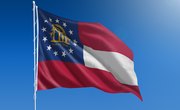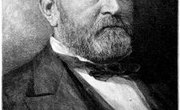The colony of Georgia has an interesting history that sets it apart from the 12 other American colonies. Georgia had a relationship to England that no other colony had. This close relationship can be seen even in its name, as it was named for King George II of England. The reason for Georgia's founding, the people who came to inhabit it and this colony's special relationship to England all contribute to Georgia's unique history.
Founding of Georgia
Georgia was the last of all the colonies to be founded. It was created in 1732 by a charter signed by King George II, for whom it was named. The charter was granted for 21 years to a group of 21 trustees, unlike the other colonies, which were royal colonies at the time they were created. This charter allowed Georgia to be run by these trustees until 1753, at which time it would revert to royal rule. The founders of Georgia had a difficult time establishing a self-sustaining colony government, however, and Georgia became a royal colony a year early, in 1752.
A British Parliament member named James Oglethorpe was chosen as its governor. Oglethorpe was concerned with the horrible conditions in debtors' prisons in England. He looked at Georgia as a place of opportunity, where the poor could move and start anew. Georgia was also created as a place where Protestants throughout Europe could come and practice their religion freely. Protestants living in Catholic nations faced an enormous amount of discrimination at the time, and Oglethorpe helped ensure that Georgia could provide a safe haven for them. Georgia was not a place of tolerance for all religions, however, as Catholicism was actually outlawed. While many other American colonies were also sanctuaries to people seeking religious freedom, only the colony of Georgia was specifically intended to fulfill this role.
Georgia's Relationship to England
All of the colonies existed with the consent of England; however, Georgia had the closest relationship with Great Britain. Georgia was the only colony to receive financial aid from Parliament. The British government also helped plan the crops that would be planted in Georgia.
As the only colony to border a Spanish territory, Georgia was used partially as a military base. Georgia was the only colony to fight with the British in the War of Austrian Succession, which pitted England forces against Spain. Georgia bordered the Spanish colony of Florida, and in 1739 Governor Oglethorpe launched an attack on the Spanish city of St. Augustine. The attack did not succeed in capturing the city, but Oglethorpe did successfully defend Savannah against a Spanish counterattack.
Additionally, the colony of Georgia prohibited slavery and the importation of alcohol until it reverted to royal rule.
Peoples of early Georgia
Settlers of Georgia were largely Protestants from throughout Europe, planters from England and debtors to whom Oglethorpe wanted to offer a new life. A year after the colony was founded, a large number of Protestants called Salzburgers came to settle and practice their faith. John Wesley, the founder of the Methodist church, also immigrated to Georgia, as well as a large number of Scottish highlanders who settled along the Georgia-Florida border.
Related Articles
References










